(PDF) The psychology of the Chinese people
VerifiedAdded on 2021/05/31
|8
|2679
|117
AI Summary
Contribute Materials
Your contribution can guide someone’s learning journey. Share your
documents today.

Critical Analysis and Reflection Paper on Chinese psychology
Secure Best Marks with AI Grader
Need help grading? Try our AI Grader for instant feedback on your assignments.
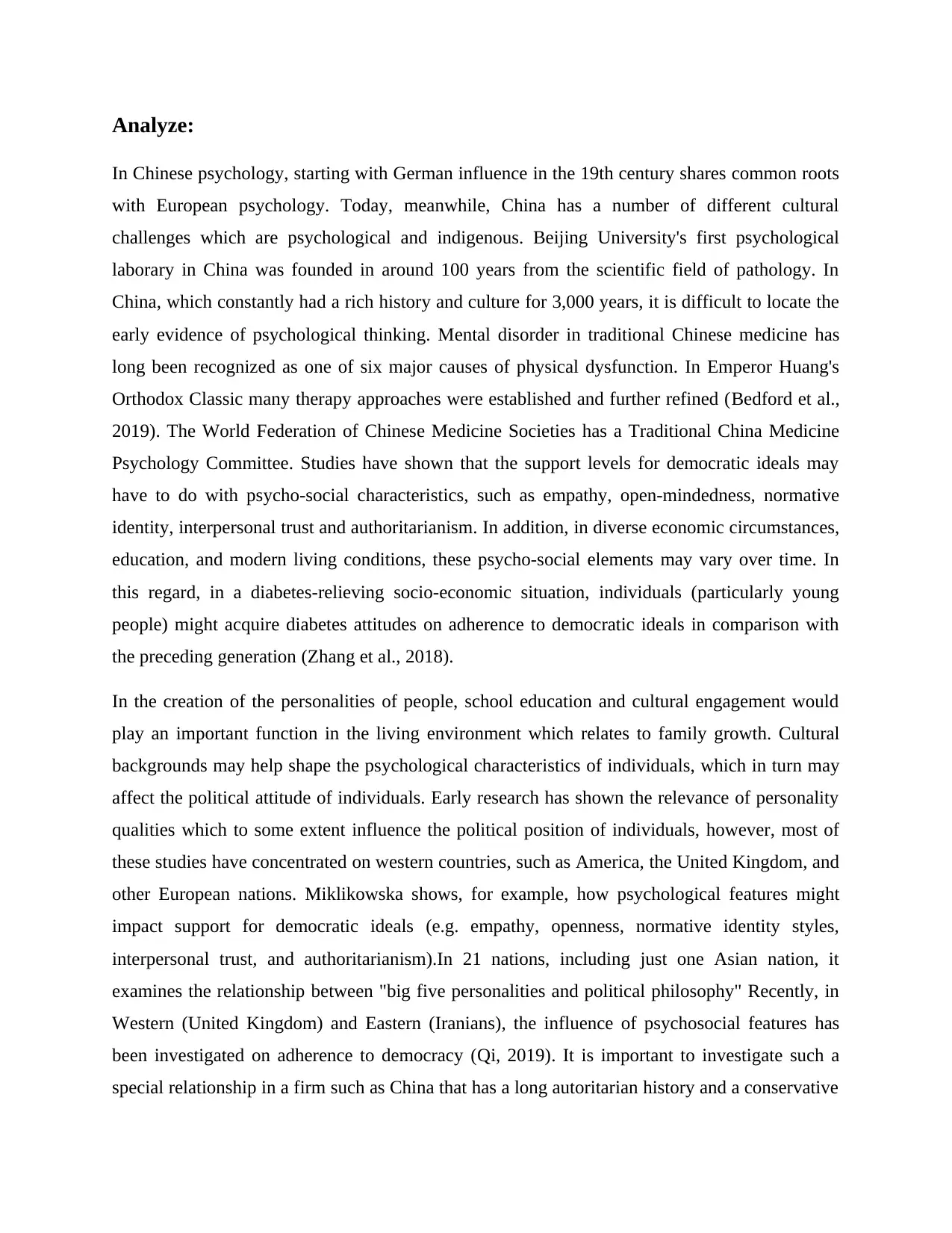
Analyze:
In Chinese psychology, starting with German influence in the 19th century shares common roots
with European psychology. Today, meanwhile, China has a number of different cultural
challenges which are psychological and indigenous. Beijing University's first psychological
laborary in China was founded in around 100 years from the scientific field of pathology. In
China, which constantly had a rich history and culture for 3,000 years, it is difficult to locate the
early evidence of psychological thinking. Mental disorder in traditional Chinese medicine has
long been recognized as one of six major causes of physical dysfunction. In Emperor Huang's
Orthodox Classic many therapy approaches were established and further refined (Bedford et al.,
2019). The World Federation of Chinese Medicine Societies has a Traditional China Medicine
Psychology Committee. Studies have shown that the support levels for democratic ideals may
have to do with psycho-social characteristics, such as empathy, open-mindedness, normative
identity, interpersonal trust and authoritarianism. In addition, in diverse economic circumstances,
education, and modern living conditions, these psycho-social elements may vary over time. In
this regard, in a diabetes-relieving socio-economic situation, individuals (particularly young
people) might acquire diabetes attitudes on adherence to democratic ideals in comparison with
the preceding generation (Zhang et al., 2018).
In the creation of the personalities of people, school education and cultural engagement would
play an important function in the living environment which relates to family growth. Cultural
backgrounds may help shape the psychological characteristics of individuals, which in turn may
affect the political attitude of individuals. Early research has shown the relevance of personality
qualities which to some extent influence the political position of individuals, however, most of
these studies have concentrated on western countries, such as America, the United Kingdom, and
other European nations. Miklikowska shows, for example, how psychological features might
impact support for democratic ideals (e.g. empathy, openness, normative identity styles,
interpersonal trust, and authoritarianism).In 21 nations, including just one Asian nation, it
examines the relationship between "big five personalities and political philosophy" Recently, in
Western (United Kingdom) and Eastern (Iranians), the influence of psychosocial features has
been investigated on adherence to democracy (Qi, 2019). It is important to investigate such a
special relationship in a firm such as China that has a long autoritarian history and a conservative
In Chinese psychology, starting with German influence in the 19th century shares common roots
with European psychology. Today, meanwhile, China has a number of different cultural
challenges which are psychological and indigenous. Beijing University's first psychological
laborary in China was founded in around 100 years from the scientific field of pathology. In
China, which constantly had a rich history and culture for 3,000 years, it is difficult to locate the
early evidence of psychological thinking. Mental disorder in traditional Chinese medicine has
long been recognized as one of six major causes of physical dysfunction. In Emperor Huang's
Orthodox Classic many therapy approaches were established and further refined (Bedford et al.,
2019). The World Federation of Chinese Medicine Societies has a Traditional China Medicine
Psychology Committee. Studies have shown that the support levels for democratic ideals may
have to do with psycho-social characteristics, such as empathy, open-mindedness, normative
identity, interpersonal trust and authoritarianism. In addition, in diverse economic circumstances,
education, and modern living conditions, these psycho-social elements may vary over time. In
this regard, in a diabetes-relieving socio-economic situation, individuals (particularly young
people) might acquire diabetes attitudes on adherence to democratic ideals in comparison with
the preceding generation (Zhang et al., 2018).
In the creation of the personalities of people, school education and cultural engagement would
play an important function in the living environment which relates to family growth. Cultural
backgrounds may help shape the psychological characteristics of individuals, which in turn may
affect the political attitude of individuals. Early research has shown the relevance of personality
qualities which to some extent influence the political position of individuals, however, most of
these studies have concentrated on western countries, such as America, the United Kingdom, and
other European nations. Miklikowska shows, for example, how psychological features might
impact support for democratic ideals (e.g. empathy, openness, normative identity styles,
interpersonal trust, and authoritarianism).In 21 nations, including just one Asian nation, it
examines the relationship between "big five personalities and political philosophy" Recently, in
Western (United Kingdom) and Eastern (Iranians), the influence of psychosocial features has
been investigated on adherence to democracy (Qi, 2019). It is important to investigate such a
special relationship in a firm such as China that has a long autoritarian history and a conservative
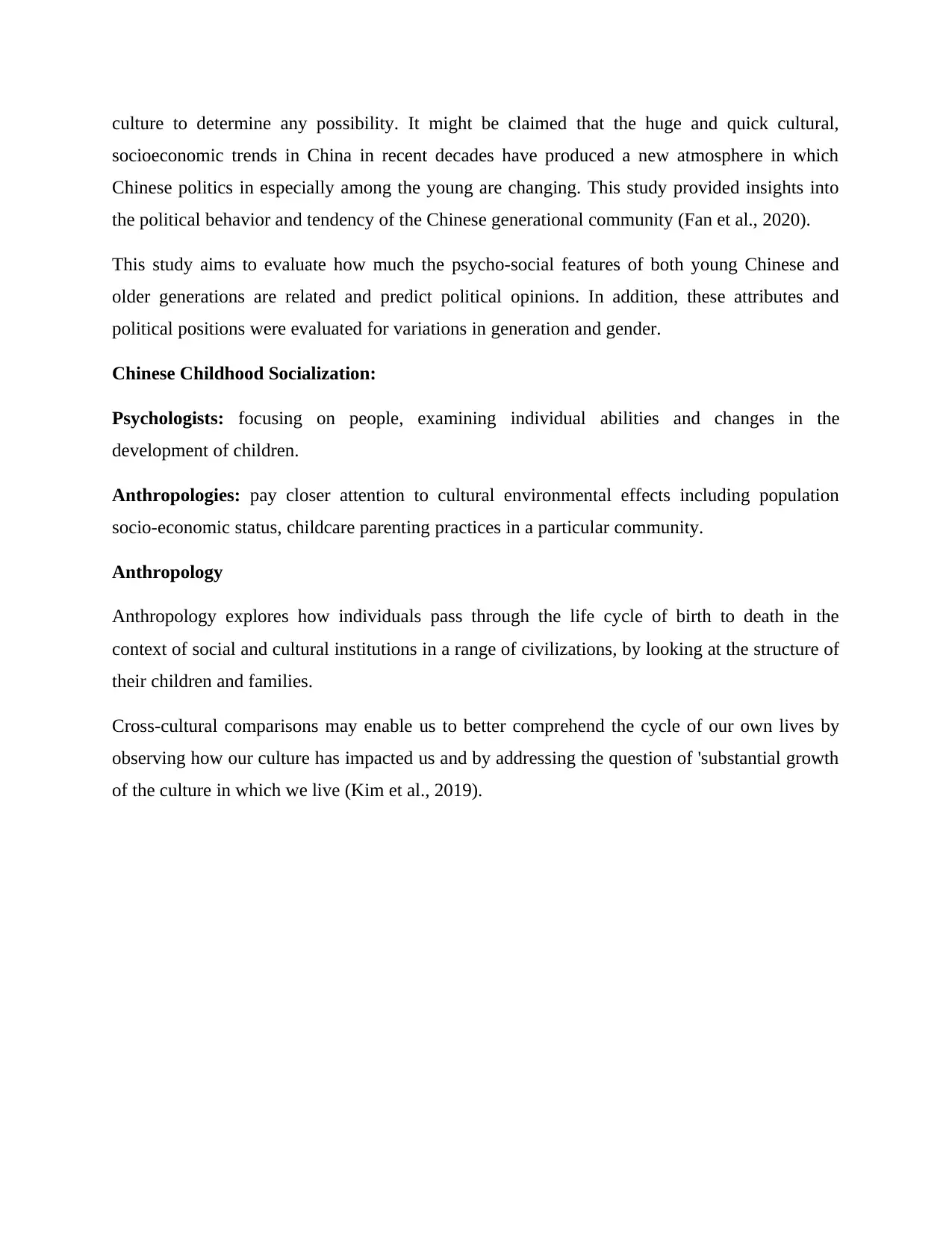
culture to determine any possibility. It might be claimed that the huge and quick cultural,
socioeconomic trends in China in recent decades have produced a new atmosphere in which
Chinese politics in especially among the young are changing. This study provided insights into
the political behavior and tendency of the Chinese generational community (Fan et al., 2020).
This study aims to evaluate how much the psycho-social features of both young Chinese and
older generations are related and predict political opinions. In addition, these attributes and
political positions were evaluated for variations in generation and gender.
Chinese Childhood Socialization:
Psychologists: focusing on people, examining individual abilities and changes in the
development of children.
Anthropologies: pay closer attention to cultural environmental effects including population
socio-economic status, childcare parenting practices in a particular community.
Anthropology
Anthropology explores how individuals pass through the life cycle of birth to death in the
context of social and cultural institutions in a range of civilizations, by looking at the structure of
their children and families.
Cross-cultural comparisons may enable us to better comprehend the cycle of our own lives by
observing how our culture has impacted us and by addressing the question of 'substantial growth
of the culture in which we live (Kim et al., 2019).
socioeconomic trends in China in recent decades have produced a new atmosphere in which
Chinese politics in especially among the young are changing. This study provided insights into
the political behavior and tendency of the Chinese generational community (Fan et al., 2020).
This study aims to evaluate how much the psycho-social features of both young Chinese and
older generations are related and predict political opinions. In addition, these attributes and
political positions were evaluated for variations in generation and gender.
Chinese Childhood Socialization:
Psychologists: focusing on people, examining individual abilities and changes in the
development of children.
Anthropologies: pay closer attention to cultural environmental effects including population
socio-economic status, childcare parenting practices in a particular community.
Anthropology
Anthropology explores how individuals pass through the life cycle of birth to death in the
context of social and cultural institutions in a range of civilizations, by looking at the structure of
their children and families.
Cross-cultural comparisons may enable us to better comprehend the cycle of our own lives by
observing how our culture has impacted us and by addressing the question of 'substantial growth
of the culture in which we live (Kim et al., 2019).
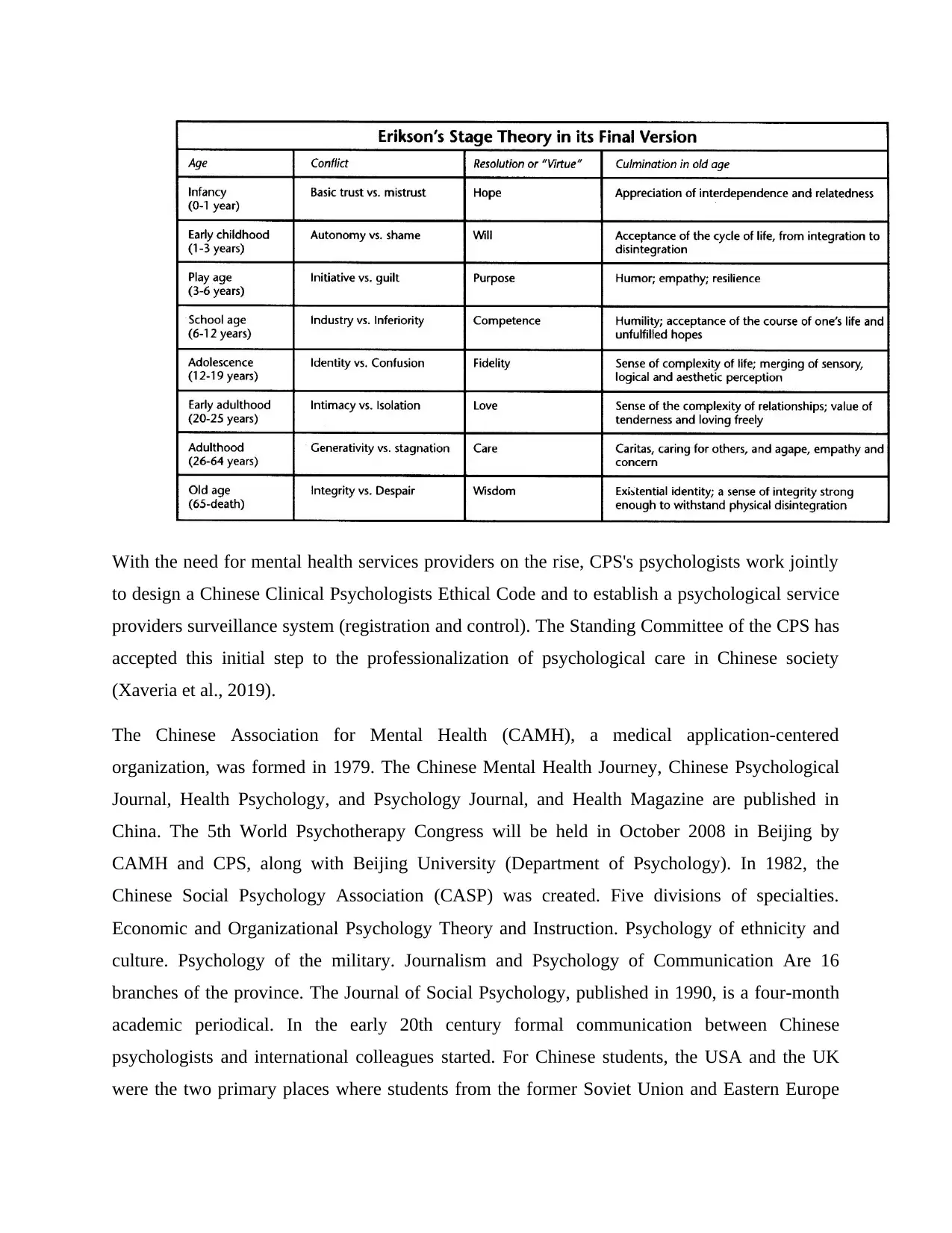
With the need for mental health services providers on the rise, CPS's psychologists work jointly
to design a Chinese Clinical Psychologists Ethical Code and to establish a psychological service
providers surveillance system (registration and control). The Standing Committee of the CPS has
accepted this initial step to the professionalization of psychological care in Chinese society
(Xaveria et al., 2019).
The Chinese Association for Mental Health (CAMH), a medical application-centered
organization, was formed in 1979. The Chinese Mental Health Journey, Chinese Psychological
Journal, Health Psychology, and Psychology Journal, and Health Magazine are published in
China. The 5th World Psychotherapy Congress will be held in October 2008 in Beijing by
CAMH and CPS, along with Beijing University (Department of Psychology). In 1982, the
Chinese Social Psychology Association (CASP) was created. Five divisions of specialties.
Economic and Organizational Psychology Theory and Instruction. Psychology of ethnicity and
culture. Psychology of the military. Journalism and Psychology of Communication Are 16
branches of the province. The Journal of Social Psychology, published in 1990, is a four-month
academic periodical. In the early 20th century formal communication between Chinese
psychologists and international colleagues started. For Chinese students, the USA and the UK
were the two primary places where students from the former Soviet Union and Eastern Europe
to design a Chinese Clinical Psychologists Ethical Code and to establish a psychological service
providers surveillance system (registration and control). The Standing Committee of the CPS has
accepted this initial step to the professionalization of psychological care in Chinese society
(Xaveria et al., 2019).
The Chinese Association for Mental Health (CAMH), a medical application-centered
organization, was formed in 1979. The Chinese Mental Health Journey, Chinese Psychological
Journal, Health Psychology, and Psychology Journal, and Health Magazine are published in
China. The 5th World Psychotherapy Congress will be held in October 2008 in Beijing by
CAMH and CPS, along with Beijing University (Department of Psychology). In 1982, the
Chinese Social Psychology Association (CASP) was created. Five divisions of specialties.
Economic and Organizational Psychology Theory and Instruction. Psychology of ethnicity and
culture. Psychology of the military. Journalism and Psychology of Communication Are 16
branches of the province. The Journal of Social Psychology, published in 1990, is a four-month
academic periodical. In the early 20th century formal communication between Chinese
psychologists and international colleagues started. For Chinese students, the USA and the UK
were the two primary places where students from the former Soviet Union and Eastern Europe
Secure Best Marks with AI Grader
Need help grading? Try our AI Grader for instant feedback on your assignments.
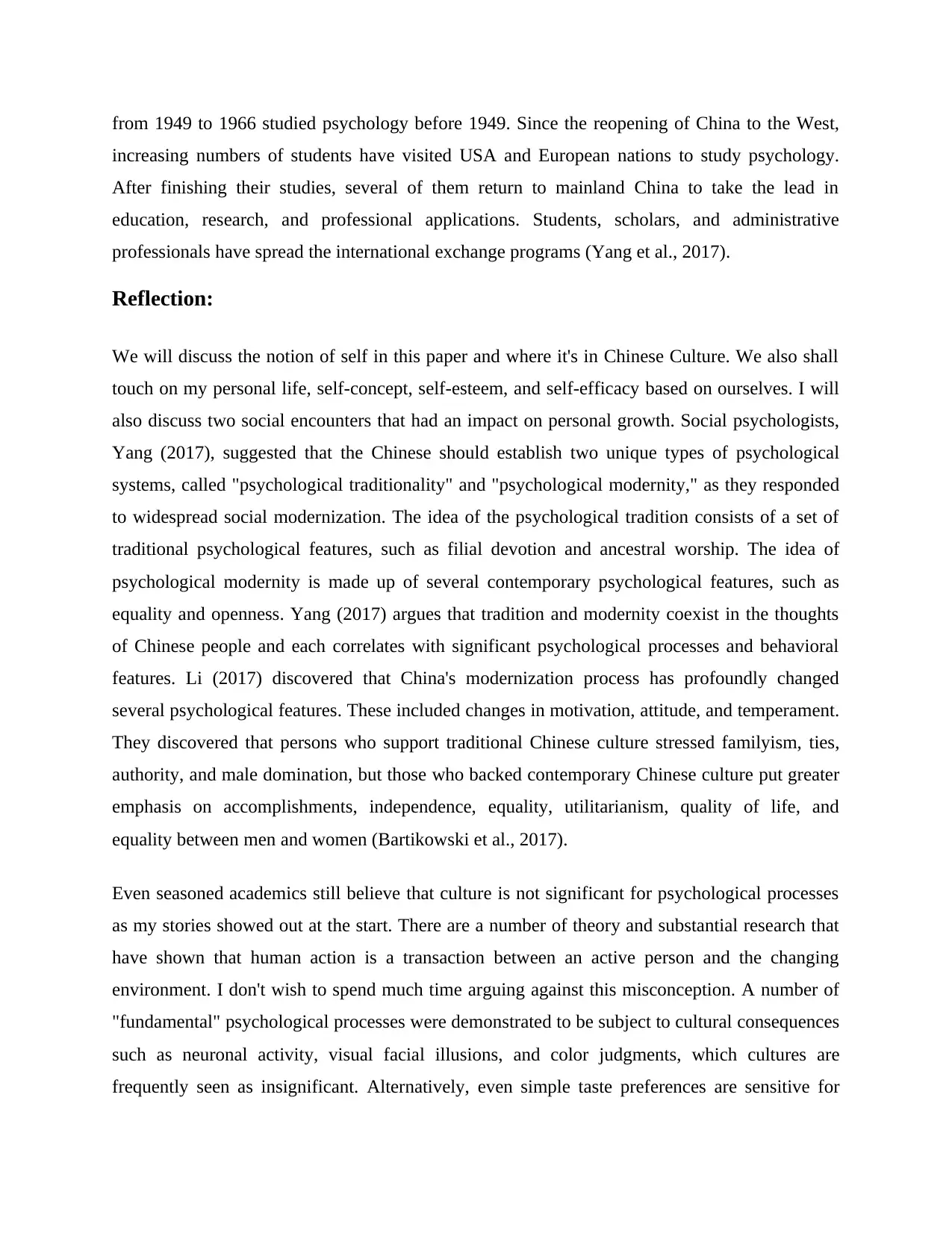
from 1949 to 1966 studied psychology before 1949. Since the reopening of China to the West,
increasing numbers of students have visited USA and European nations to study psychology.
After finishing their studies, several of them return to mainland China to take the lead in
education, research, and professional applications. Students, scholars, and administrative
professionals have spread the international exchange programs (Yang et al., 2017).
Reflection:
We will discuss the notion of self in this paper and where it's in Chinese Culture. We also shall
touch on my personal life, self-concept, self-esteem, and self-efficacy based on ourselves. I will
also discuss two social encounters that had an impact on personal growth. Social psychologists,
Yang (2017), suggested that the Chinese should establish two unique types of psychological
systems, called "psychological traditionality" and "psychological modernity," as they responded
to widespread social modernization. The idea of the psychological tradition consists of a set of
traditional psychological features, such as filial devotion and ancestral worship. The idea of
psychological modernity is made up of several contemporary psychological features, such as
equality and openness. Yang (2017) argues that tradition and modernity coexist in the thoughts
of Chinese people and each correlates with significant psychological processes and behavioral
features. Li (2017) discovered that China's modernization process has profoundly changed
several psychological features. These included changes in motivation, attitude, and temperament.
They discovered that persons who support traditional Chinese culture stressed familyism, ties,
authority, and male domination, but those who backed contemporary Chinese culture put greater
emphasis on accomplishments, independence, equality, utilitarianism, quality of life, and
equality between men and women (Bartikowski et al., 2017).
Even seasoned academics still believe that culture is not significant for psychological processes
as my stories showed out at the start. There are a number of theory and substantial research that
have shown that human action is a transaction between an active person and the changing
environment. I don't wish to spend much time arguing against this misconception. A number of
"fundamental" psychological processes were demonstrated to be subject to cultural consequences
such as neuronal activity, visual facial illusions, and color judgments, which cultures are
frequently seen as insignificant. Alternatively, even simple taste preferences are sensitive for
increasing numbers of students have visited USA and European nations to study psychology.
After finishing their studies, several of them return to mainland China to take the lead in
education, research, and professional applications. Students, scholars, and administrative
professionals have spread the international exchange programs (Yang et al., 2017).
Reflection:
We will discuss the notion of self in this paper and where it's in Chinese Culture. We also shall
touch on my personal life, self-concept, self-esteem, and self-efficacy based on ourselves. I will
also discuss two social encounters that had an impact on personal growth. Social psychologists,
Yang (2017), suggested that the Chinese should establish two unique types of psychological
systems, called "psychological traditionality" and "psychological modernity," as they responded
to widespread social modernization. The idea of the psychological tradition consists of a set of
traditional psychological features, such as filial devotion and ancestral worship. The idea of
psychological modernity is made up of several contemporary psychological features, such as
equality and openness. Yang (2017) argues that tradition and modernity coexist in the thoughts
of Chinese people and each correlates with significant psychological processes and behavioral
features. Li (2017) discovered that China's modernization process has profoundly changed
several psychological features. These included changes in motivation, attitude, and temperament.
They discovered that persons who support traditional Chinese culture stressed familyism, ties,
authority, and male domination, but those who backed contemporary Chinese culture put greater
emphasis on accomplishments, independence, equality, utilitarianism, quality of life, and
equality between men and women (Bartikowski et al., 2017).
Even seasoned academics still believe that culture is not significant for psychological processes
as my stories showed out at the start. There are a number of theory and substantial research that
have shown that human action is a transaction between an active person and the changing
environment. I don't wish to spend much time arguing against this misconception. A number of
"fundamental" psychological processes were demonstrated to be subject to cultural consequences
such as neuronal activity, visual facial illusions, and color judgments, which cultures are
frequently seen as insignificant. Alternatively, even simple taste preferences are sensitive for
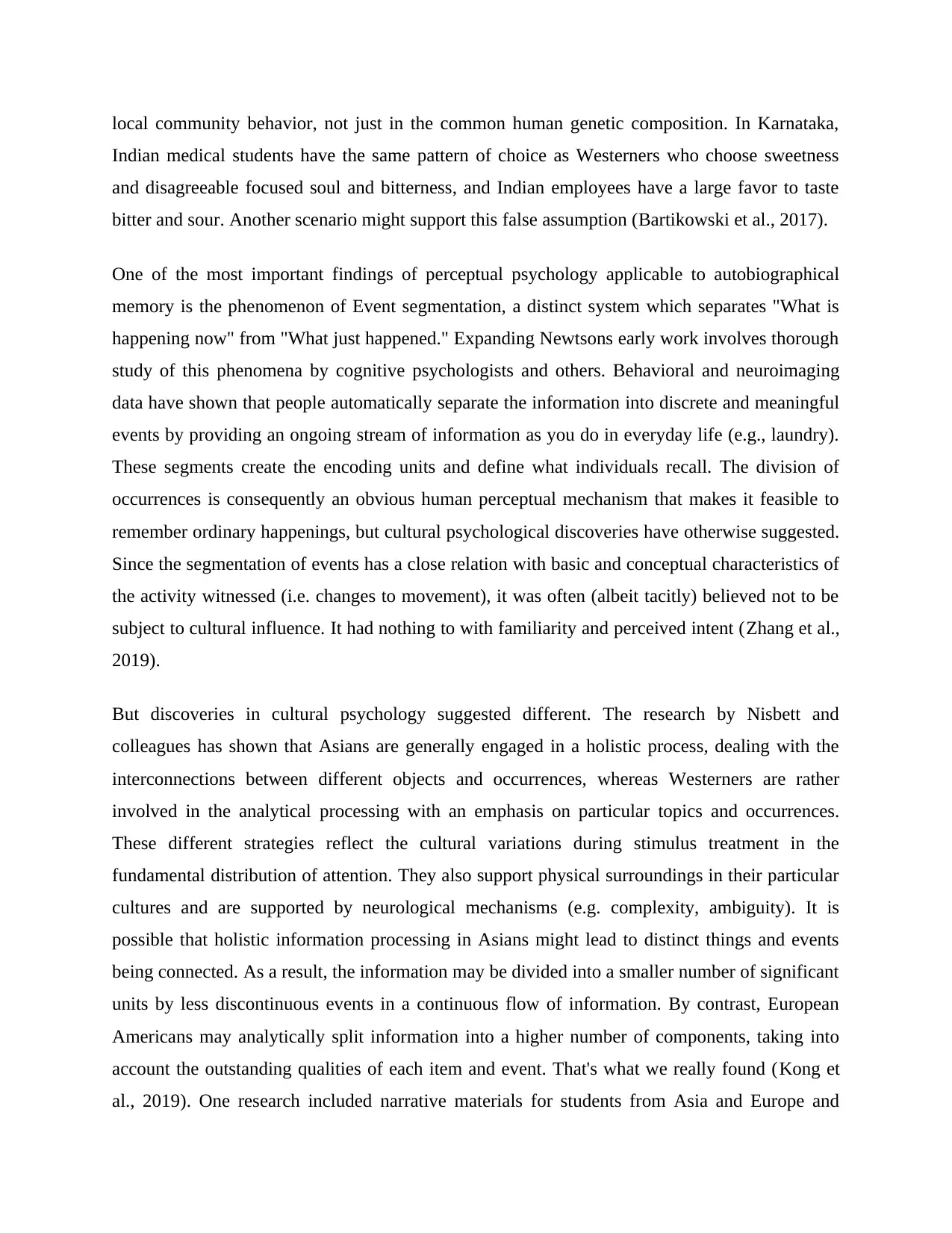
local community behavior, not just in the common human genetic composition. In Karnataka,
Indian medical students have the same pattern of choice as Westerners who choose sweetness
and disagreeable focused soul and bitterness, and Indian employees have a large favor to taste
bitter and sour. Another scenario might support this false assumption (Bartikowski et al., 2017).
One of the most important findings of perceptual psychology applicable to autobiographical
memory is the phenomenon of Event segmentation, a distinct system which separates "What is
happening now" from "What just happened." Expanding Newtsons early work involves thorough
study of this phenomena by cognitive psychologists and others. Behavioral and neuroimaging
data have shown that people automatically separate the information into discrete and meaningful
events by providing an ongoing stream of information as you do in everyday life (e.g., laundry).
These segments create the encoding units and define what individuals recall. The division of
occurrences is consequently an obvious human perceptual mechanism that makes it feasible to
remember ordinary happenings, but cultural psychological discoveries have otherwise suggested.
Since the segmentation of events has a close relation with basic and conceptual characteristics of
the activity witnessed (i.e. changes to movement), it was often (albeit tacitly) believed not to be
subject to cultural influence. It had nothing to with familiarity and perceived intent (Zhang et al.,
2019).
But discoveries in cultural psychology suggested different. The research by Nisbett and
colleagues has shown that Asians are generally engaged in a holistic process, dealing with the
interconnections between different objects and occurrences, whereas Westerners are rather
involved in the analytical processing with an emphasis on particular topics and occurrences.
These different strategies reflect the cultural variations during stimulus treatment in the
fundamental distribution of attention. They also support physical surroundings in their particular
cultures and are supported by neurological mechanisms (e.g. complexity, ambiguity). It is
possible that holistic information processing in Asians might lead to distinct things and events
being connected. As a result, the information may be divided into a smaller number of significant
units by less discontinuous events in a continuous flow of information. By contrast, European
Americans may analytically split information into a higher number of components, taking into
account the outstanding qualities of each item and event. That's what we really found (Kong et
al., 2019). One research included narrative materials for students from Asia and Europe and
Indian medical students have the same pattern of choice as Westerners who choose sweetness
and disagreeable focused soul and bitterness, and Indian employees have a large favor to taste
bitter and sour. Another scenario might support this false assumption (Bartikowski et al., 2017).
One of the most important findings of perceptual psychology applicable to autobiographical
memory is the phenomenon of Event segmentation, a distinct system which separates "What is
happening now" from "What just happened." Expanding Newtsons early work involves thorough
study of this phenomena by cognitive psychologists and others. Behavioral and neuroimaging
data have shown that people automatically separate the information into discrete and meaningful
events by providing an ongoing stream of information as you do in everyday life (e.g., laundry).
These segments create the encoding units and define what individuals recall. The division of
occurrences is consequently an obvious human perceptual mechanism that makes it feasible to
remember ordinary happenings, but cultural psychological discoveries have otherwise suggested.
Since the segmentation of events has a close relation with basic and conceptual characteristics of
the activity witnessed (i.e. changes to movement), it was often (albeit tacitly) believed not to be
subject to cultural influence. It had nothing to with familiarity and perceived intent (Zhang et al.,
2019).
But discoveries in cultural psychology suggested different. The research by Nisbett and
colleagues has shown that Asians are generally engaged in a holistic process, dealing with the
interconnections between different objects and occurrences, whereas Westerners are rather
involved in the analytical processing with an emphasis on particular topics and occurrences.
These different strategies reflect the cultural variations during stimulus treatment in the
fundamental distribution of attention. They also support physical surroundings in their particular
cultures and are supported by neurological mechanisms (e.g. complexity, ambiguity). It is
possible that holistic information processing in Asians might lead to distinct things and events
being connected. As a result, the information may be divided into a smaller number of significant
units by less discontinuous events in a continuous flow of information. By contrast, European
Americans may analytically split information into a higher number of components, taking into
account the outstanding qualities of each item and event. That's what we really found (Kong et
al., 2019). One research included narrative materials for students from Asia and Europe and
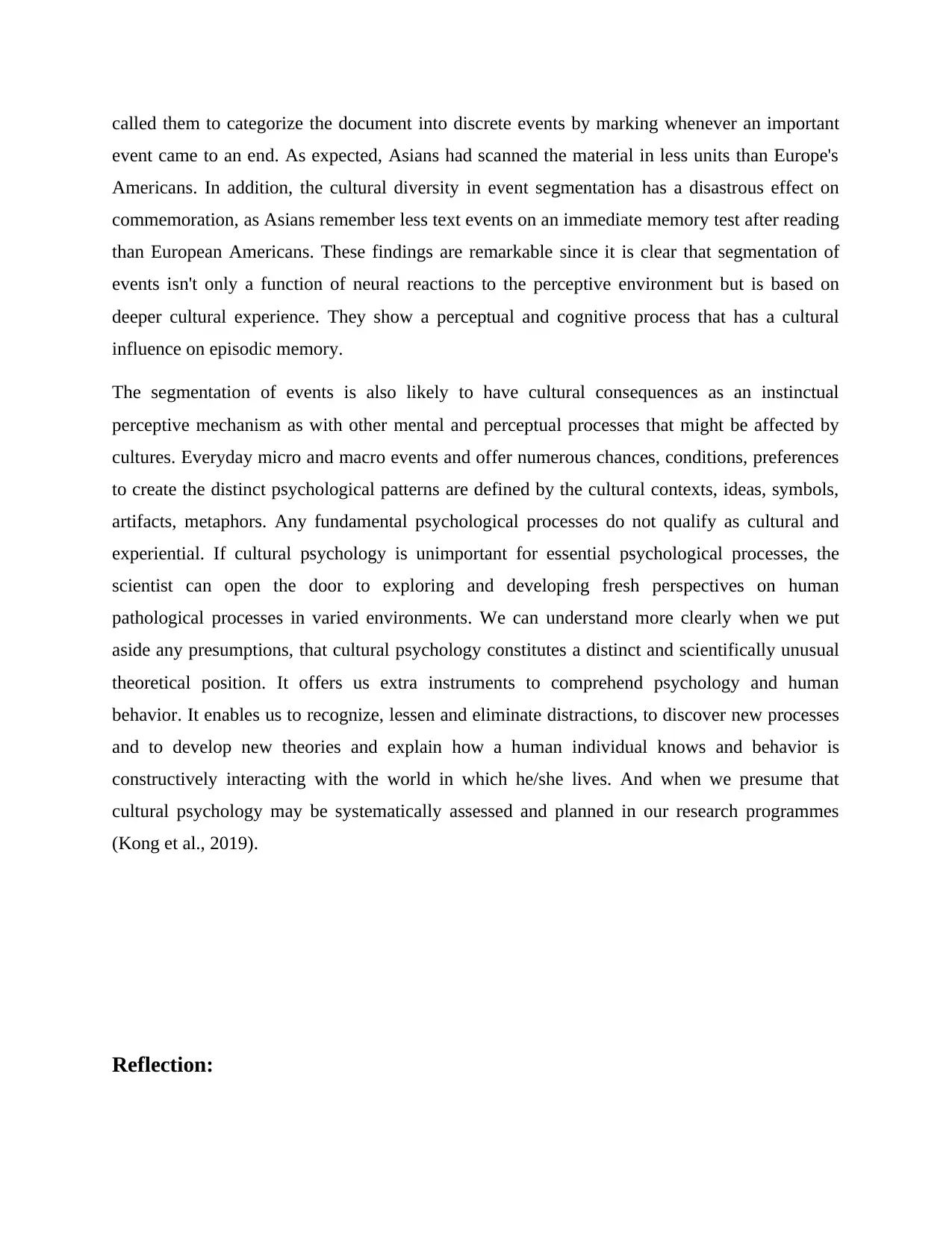
called them to categorize the document into discrete events by marking whenever an important
event came to an end. As expected, Asians had scanned the material in less units than Europe's
Americans. In addition, the cultural diversity in event segmentation has a disastrous effect on
commemoration, as Asians remember less text events on an immediate memory test after reading
than European Americans. These findings are remarkable since it is clear that segmentation of
events isn't only a function of neural reactions to the perceptive environment but is based on
deeper cultural experience. They show a perceptual and cognitive process that has a cultural
influence on episodic memory.
The segmentation of events is also likely to have cultural consequences as an instinctual
perceptive mechanism as with other mental and perceptual processes that might be affected by
cultures. Everyday micro and macro events and offer numerous chances, conditions, preferences
to create the distinct psychological patterns are defined by the cultural contexts, ideas, symbols,
artifacts, metaphors. Any fundamental psychological processes do not qualify as cultural and
experiential. If cultural psychology is unimportant for essential psychological processes, the
scientist can open the door to exploring and developing fresh perspectives on human
pathological processes in varied environments. We can understand more clearly when we put
aside any presumptions, that cultural psychology constitutes a distinct and scientifically unusual
theoretical position. It offers us extra instruments to comprehend psychology and human
behavior. It enables us to recognize, lessen and eliminate distractions, to discover new processes
and to develop new theories and explain how a human individual knows and behavior is
constructively interacting with the world in which he/she lives. And when we presume that
cultural psychology may be systematically assessed and planned in our research programmes
(Kong et al., 2019).
Reflection:
event came to an end. As expected, Asians had scanned the material in less units than Europe's
Americans. In addition, the cultural diversity in event segmentation has a disastrous effect on
commemoration, as Asians remember less text events on an immediate memory test after reading
than European Americans. These findings are remarkable since it is clear that segmentation of
events isn't only a function of neural reactions to the perceptive environment but is based on
deeper cultural experience. They show a perceptual and cognitive process that has a cultural
influence on episodic memory.
The segmentation of events is also likely to have cultural consequences as an instinctual
perceptive mechanism as with other mental and perceptual processes that might be affected by
cultures. Everyday micro and macro events and offer numerous chances, conditions, preferences
to create the distinct psychological patterns are defined by the cultural contexts, ideas, symbols,
artifacts, metaphors. Any fundamental psychological processes do not qualify as cultural and
experiential. If cultural psychology is unimportant for essential psychological processes, the
scientist can open the door to exploring and developing fresh perspectives on human
pathological processes in varied environments. We can understand more clearly when we put
aside any presumptions, that cultural psychology constitutes a distinct and scientifically unusual
theoretical position. It offers us extra instruments to comprehend psychology and human
behavior. It enables us to recognize, lessen and eliminate distractions, to discover new processes
and to develop new theories and explain how a human individual knows and behavior is
constructively interacting with the world in which he/she lives. And when we presume that
cultural psychology may be systematically assessed and planned in our research programmes
(Kong et al., 2019).
Reflection:
Paraphrase This Document
Need a fresh take? Get an instant paraphrase of this document with our AI Paraphraser
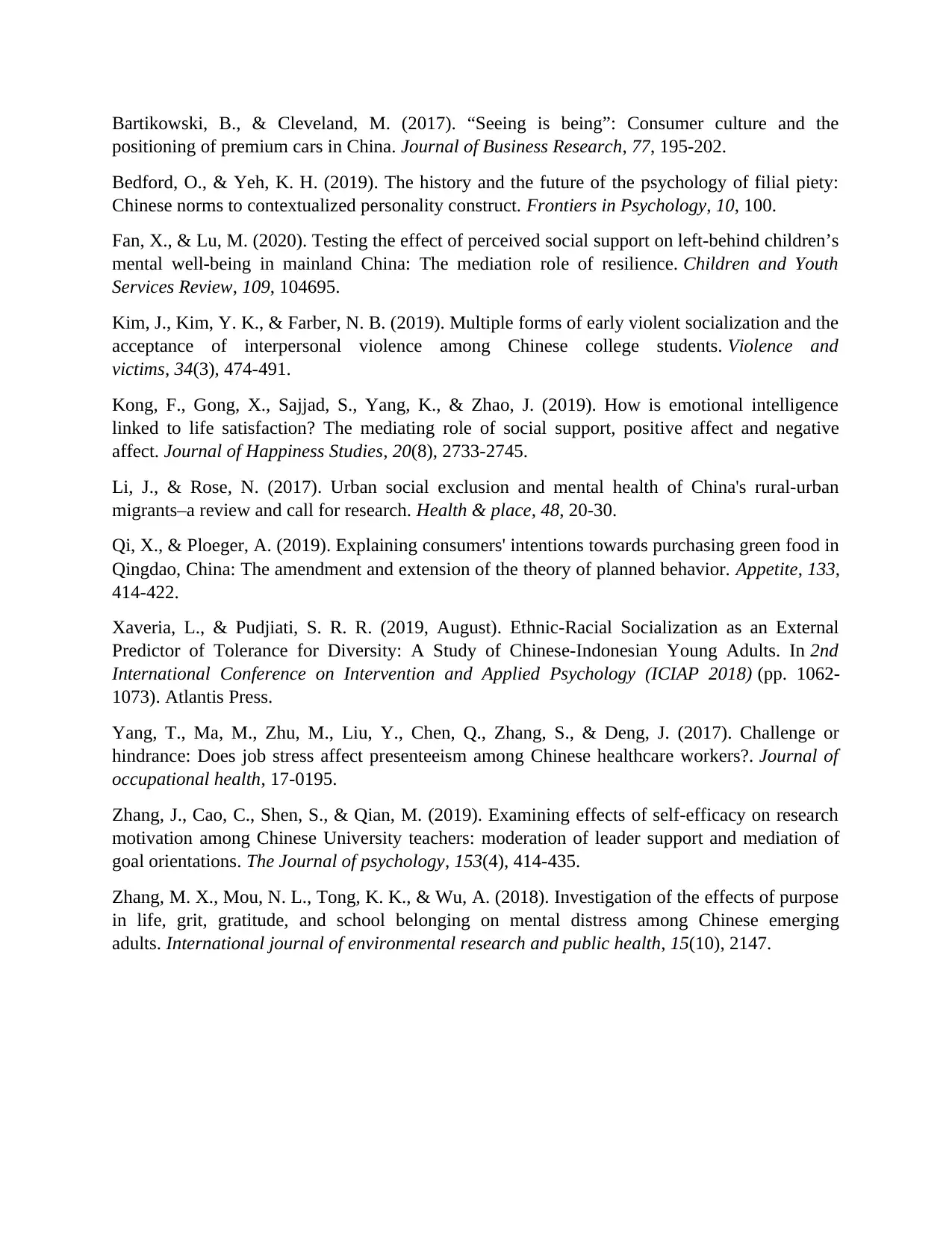
Bartikowski, B., & Cleveland, M. (2017). “Seeing is being”: Consumer culture and the
positioning of premium cars in China. Journal of Business Research, 77, 195-202.
Bedford, O., & Yeh, K. H. (2019). The history and the future of the psychology of filial piety:
Chinese norms to contextualized personality construct. Frontiers in Psychology, 10, 100.
Fan, X., & Lu, M. (2020). Testing the effect of perceived social support on left-behind children’s
mental well-being in mainland China: The mediation role of resilience. Children and Youth
Services Review, 109, 104695.
Kim, J., Kim, Y. K., & Farber, N. B. (2019). Multiple forms of early violent socialization and the
acceptance of interpersonal violence among Chinese college students. Violence and
victims, 34(3), 474-491.
Kong, F., Gong, X., Sajjad, S., Yang, K., & Zhao, J. (2019). How is emotional intelligence
linked to life satisfaction? The mediating role of social support, positive affect and negative
affect. Journal of Happiness Studies, 20(8), 2733-2745.
Li, J., & Rose, N. (2017). Urban social exclusion and mental health of China's rural-urban
migrants–a review and call for research. Health & place, 48, 20-30.
Qi, X., & Ploeger, A. (2019). Explaining consumers' intentions towards purchasing green food in
Qingdao, China: The amendment and extension of the theory of planned behavior. Appetite, 133,
414-422.
Xaveria, L., & Pudjiati, S. R. R. (2019, August). Ethnic-Racial Socialization as an External
Predictor of Tolerance for Diversity: A Study of Chinese-Indonesian Young Adults. In 2nd
International Conference on Intervention and Applied Psychology (ICIAP 2018) (pp. 1062-
1073). Atlantis Press.
Yang, T., Ma, M., Zhu, M., Liu, Y., Chen, Q., Zhang, S., & Deng, J. (2017). Challenge or
hindrance: Does job stress affect presenteeism among Chinese healthcare workers?. Journal of
occupational health, 17-0195.
Zhang, J., Cao, C., Shen, S., & Qian, M. (2019). Examining effects of self-efficacy on research
motivation among Chinese University teachers: moderation of leader support and mediation of
goal orientations. The Journal of psychology, 153(4), 414-435.
Zhang, M. X., Mou, N. L., Tong, K. K., & Wu, A. (2018). Investigation of the effects of purpose
in life, grit, gratitude, and school belonging on mental distress among Chinese emerging
adults. International journal of environmental research and public health, 15(10), 2147.
positioning of premium cars in China. Journal of Business Research, 77, 195-202.
Bedford, O., & Yeh, K. H. (2019). The history and the future of the psychology of filial piety:
Chinese norms to contextualized personality construct. Frontiers in Psychology, 10, 100.
Fan, X., & Lu, M. (2020). Testing the effect of perceived social support on left-behind children’s
mental well-being in mainland China: The mediation role of resilience. Children and Youth
Services Review, 109, 104695.
Kim, J., Kim, Y. K., & Farber, N. B. (2019). Multiple forms of early violent socialization and the
acceptance of interpersonal violence among Chinese college students. Violence and
victims, 34(3), 474-491.
Kong, F., Gong, X., Sajjad, S., Yang, K., & Zhao, J. (2019). How is emotional intelligence
linked to life satisfaction? The mediating role of social support, positive affect and negative
affect. Journal of Happiness Studies, 20(8), 2733-2745.
Li, J., & Rose, N. (2017). Urban social exclusion and mental health of China's rural-urban
migrants–a review and call for research. Health & place, 48, 20-30.
Qi, X., & Ploeger, A. (2019). Explaining consumers' intentions towards purchasing green food in
Qingdao, China: The amendment and extension of the theory of planned behavior. Appetite, 133,
414-422.
Xaveria, L., & Pudjiati, S. R. R. (2019, August). Ethnic-Racial Socialization as an External
Predictor of Tolerance for Diversity: A Study of Chinese-Indonesian Young Adults. In 2nd
International Conference on Intervention and Applied Psychology (ICIAP 2018) (pp. 1062-
1073). Atlantis Press.
Yang, T., Ma, M., Zhu, M., Liu, Y., Chen, Q., Zhang, S., & Deng, J. (2017). Challenge or
hindrance: Does job stress affect presenteeism among Chinese healthcare workers?. Journal of
occupational health, 17-0195.
Zhang, J., Cao, C., Shen, S., & Qian, M. (2019). Examining effects of self-efficacy on research
motivation among Chinese University teachers: moderation of leader support and mediation of
goal orientations. The Journal of psychology, 153(4), 414-435.
Zhang, M. X., Mou, N. L., Tong, K. K., & Wu, A. (2018). Investigation of the effects of purpose
in life, grit, gratitude, and school belonging on mental distress among Chinese emerging
adults. International journal of environmental research and public health, 15(10), 2147.
1 out of 8
Your All-in-One AI-Powered Toolkit for Academic Success.
+13062052269
info@desklib.com
Available 24*7 on WhatsApp / Email
![[object Object]](/_next/static/media/star-bottom.7253800d.svg)
Unlock your academic potential
© 2024 | Zucol Services PVT LTD | All rights reserved.